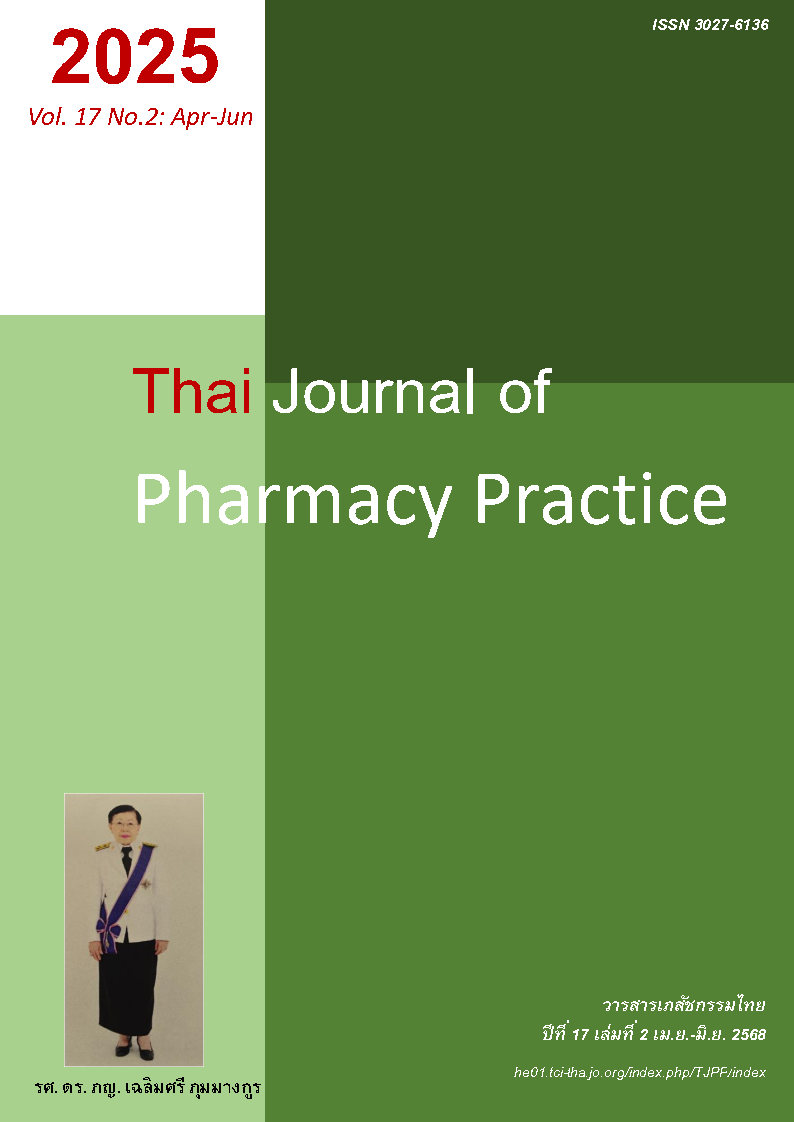ประสิทธิผลของรูปแบบการดูแลผู้สูงอายุในการป้องกันภาวะสมองเสื่อมโดย อาศัยการมีส่วนร่วมของชุมชนตำบลโคกยาง อำเภอกันตัง จังหวัดตรัง
Main Article Content
บทคัดย่อ
วัตถุประสงค์: เพื่อประเมินประสิทธิของผลรูปแบบการดูแลผู้สูงอายุเพื่อป้องกันภาวะสมองเสื่อมโดยอาศัยการมีส่วนร่วมของชุมชนในพื้นที่รับผิดชอบของโรงพยาบาลส่งเสริมสุขภาพตำบล (รพสต.) โคกยาง อำเภอกันตัง จังหวัดตรัง วิธีการ: การศึกษานี้เป็นการวิจัยกึ่งทดลองในตัวอย่างกลุ่มเดียวที่วัดผลก่อนและหลังการแทรกแซง กลุ่มตัวอย่าง คือ ผู้สูงอายุที่มีอายุ 60 ปีขึ้นไปที่อาศัยอยู่ในหมู่บ้านในพื้นที่รับผิดชอบของ รพสต. โคกยาง จำนวน 50 คน การศึกษาดำเนินการตั้งแต่เดือนมิถุนายน ถึง ธันวาคม 2567 กิจกรรมหลักของรูปแบบการดูแลผู้สูงอายุเพื่อป้องกันภาวะสมองเสื่อม ได้แก่ 1) กิจกรรมสร้างสัมพันธภาพ โดยตรวจคัดกรองและตรวจสุขภาพผู้สูงอายุ ให้ความรู้เรื่องการดูแลผู้สูงอายุเพื่อป้องกันภาวะสมองเสื่อม และสร้างเครือข่ายออกกําลังกายผ้าขาวม้า 2) กิจกรรมการเยี่ยมบ้านผู้สูงอายุในชุมชนและบัดดี้ผู้สูงวัย และ 3) กิจกรรมออกกำลังกายป้องกันภาวะสมองเสื่อม เครื่องมือในการเก็บรวบรวมข้อมูลได้แก่ แบบทดสอบสมรรถภาพของสมองเบื้องต้น (Thai Mini-Mental State Examination หรือ TMSE-Thai) แบบทดสอบความรู้เกี่ยวกับภาวะสมองเสื่อม และแบบประเมินพฤติกรรมการป้องกันภาวะสมองเสื่อม การประเมินทำก่อนให้การแทรกแซงและหลังให้การแทรกแซงเป็นเวลา 6 สัปดาห์ ผลการศึกษา: คะแนนเฉลี่ยของสมรรถภาพของสมองหลังใช้รูปแบบการดูแลผู้สูงอายุเพื่อป้องกันภาวะสมองเสื่อมสูงกว่าก่อนใช้รูปแบบดังกล่าวอย่างมีนัยสำคัญทางสถิติ (29.10±1.58 และ 28.25±1.89 ตามลำดับ; P<0.05) คะแนนเฉลี่ยของความรู้เกี่ยวกับภาวะสมองเสื่อม (13.92±1.07 และ 8.72±6.29 ตามลำดับ) และพฤติกรรมการป้องกันภาวะสมองเสื่อม (2.14±0.35 และ 1.96±0.19 ตามลำดับ) มีลักษณะเช่นเดียวกัน สรุป: การมีส่วนร่วมของชุมชนเป็นส่วนสำคัญในการเสริมสร้างศักยภาพของผู้สูงอายุในการดูแลสุขภาพของตนเอง ผู้เกี่ยวข้องสามารถนำรูปแบบการดำเนินการในการวิจัยนี้ไปประยุกต์ใช้ในการพัฒนารูปแบบการดูแลผู้สูงอายุในบริบทของชุมชนอื่นได้ต่อไป
Article Details

อนุญาตภายใต้เงื่อนไข Creative Commons Attribution-NonCommercial-NoDerivatives 4.0 International License.
ผลการวิจัยและความคิดเห็นที่ปรากฏในบทความถือเป็นความคิดเห็นและอยู่ในความรับผิดชอบของผู้นิพนธ์ มิใช่ความเห็นหรือความรับผิดชอบของกองบรรณาธิการ หรือคณะเภสัชศาสตร์ มหาวิทยาลัยสงขลานครินทร์ ทั้งนี้ไม่รวมความผิดพลาดอันเกิดจากการพิมพ์ บทความที่ได้รับการเผยแพร่โดยวารสารเภสัชกรรมไทยถือเป็นสิทธิ์ของวารสารฯ
เอกสารอ้างอิง
Department of Older Persons. Elderly statistics: Thai elderly statistics 2022 by the Policy and Strategy Group, Department of Older Persons. Bangkok: Department of Older Persons; 2022.
Suwan A. Role of nurses in caring for elderly individuals with dementia. Journal of Nursing and Health Care. 2017; 35: 6-15.
Khemapech S, Homdee R. Health promotion for dementia prevention. Journal of Police Nursing. 2020; 12: 23-56.
Elderly Nutrition Promotion Group, Bureau of Nutrition, Department of Health. Guidelines for dementia prevention in the elderly: “How to eat... to stay away from dementia” Vol. 1 [online]. 2023 [cited Feb 9, 2024]. Available from: nutrition2.anamai.mop h.go.th/th/elderly-doc/download?id=47684&mid=32 225 &mkey=m_document&lang=th&did=15636
Ministry of Public Health. Population pyramid by gender and age group, Trang Province [online]. 2023 [cited Feb 9, 2024]. Available from: trg.hdc.moph.go .th/hdc/reports/report.php?&cat_id=ac4eed1bddb23d6130746d62d2538fd0&id=db4e8d42e1234a75bd03d430c31feb2f
Kraanual S, Prasitphatthawet A, Piban A, Mata A, Klaisim R, Kraanual C, et al. Elderly care model through integrated community participation in a multicultural society: Yupo Subdistrict Municipality, Mueang District, Yala Province. Yala: Yala Rajabhat University: 2020.
Cohen J, Uphoff N. Rural development participation: Concept and measures for project design implementation and evaluation. New York: Cornell University; 1977.
Thai Nurses Association. Dementia screening tool (TMSE) [online]. 2019 [cited Feb 9, 2024]. Available from: www.thainurse.org/wordpress/?p=12039
Faimuenwai R, Kimsungnuen N, Rueanrudipirom K. The elderly care model: The answer is the community health system. Thailand Journal of Health Promotion and Environmental Health 2021; 44(3): 11-22.
Sireci SG, Witty MR. Construct validity: A primer. J Educ Meas 2007; 44: 315-37.
Sijtsma K. On the use, the misuse, and the very limited usefulness of Cronbach's alpha. Psychome trika 2009; 74: 107-20.
Kuha O, Vidhyachak C, Phatcharapisitgul P, Kumni yom N, Mungklang M, Wisajun P, et al. Cognitive training for the elderly with mild neurocognitive disorder: utilizing TEAM-V program in urban and rural areas with a six-month follow-up. Journal of the Psychiatric Association of Thailand. 2023; 68: 102-14.
Somsri C. The development of a 5-dimensional happiness model for the elderly with mild cognitive impaired Nakhon Phanom Hospital. Journal of Nakhon Phanom Hospital. 2021; 8: 78-93.
Hawong S, Thaingtham W, Nanthamongkolchai S. The health promotion program for the elderly at risk group of alzheimer’s in community. Journal of Public Health Nursing 2017; 31: 110-28.
World Health Organization. Community health workers: A resource for healthy aging and addressing dementia [online]. 2019 [cited Feb 9, 2024]. Available from: www.alz.org/media/Document s/community-health-workers-a-resource-for-healthy- aging-and-addressing-dementia.pdf
Hung L, Leitch S, Hung R, Phinney A. Creating dementia-friendly and inclusive communities for social inclusion: A scoping review protocol. BMJ Open 2020; 10: e035028. doi:10.1136/bmjopen-2019-035028.
Chankam K, Raksin M, Songserm N. Development of dementia prevention model for the elderly through the participation of family public health volunteers in Nam Yeun district, Ubon Ratchathani province. Journal of MCU Ubon Review 2020; 5: 255-66.
Samruamchit K, Lagampan S, Amnatsatsue K. Effects of a brain function promoting program on cognitive function and dementia prevention behaviors for older adults. Journal of Health and Nursing Research. 2019; 35: 34-45.
Sritumna P, Ruangrit R. Development of caring model for older adults with dementia in community through family and community participation. Journal of Health Research and Innovation Development. 2023; 4: 192-202.


